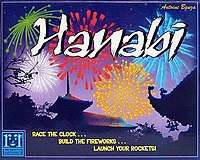Hanabi (card game)
 The box cover of Hanabi | |
| Designer(s) | Antoine Bauza |
|---|---|
| Publisher(s) | Asmodée Éditions |
| Players | 2 to 5 |
| Setup time | 5 minutes |
| Playing time | 20-30 minutes |
| Random chance | Medium |
| Skill(s) required | Deduction, Memory, Cooperation, Planning |
Hanabi is a cooperative card game published in 2010[1] in which players, aware of other players' cards but not their own, attempt to play a series of cards in a specific order to set off a simulated fireworks show. Players are limited in the types of information they may give to other players, and in the total amount of information that can be given during the game. In 2013, Hanabi won the Spiel des Jahres, a prestigious industry award for best board game of the year.
Gameplay
The Hanabi deck contains cards in five suits (white, yellow, green, blue, and red): three 1's, two each of 2's, 3's, and 4's, and one 5. The game begins with 8 available information tokens and 3 fuse tokens. To start the game, players are dealt a hand containing five cards (four for 4 or 5 players). As in Indian poker, players can see each other's cards but they cannot see their own. Play proceeds around the table; each turn, a player must take one of the following actions:
- Give information: The player points out the cards of either a given number or a given suit in the hand of another player (examples: "This card is your only red card," "These two cards are your only 3's"). The information given must be complete and correct. (In some editions, it is allowed to indicate that a player has zero of something; other versions explicitly forbid this case.) Giving information consumes one information token.
- Discard a card: The player chooses a card from his hand and adds it to the discard pile, then draws a card to replace it. The discarded card is out of the game and can no longer be played. Discarding a card replenishes one information token.
- Play a card: The player chooses a card from his hand and attempts to add it to the cards already played. This is successful if the card is a 1 in a suit that has not yet been played, or if it is the next number sequentially in a suit that has been played. Otherwise a fuse token is consumed and the misplayed card is discarded. Successfully playing a 5 of any suit replenishes one information token. Whether the play was successful or not, the player draws a replacement card.
Players lose immediately if all fuse tokens are gone, and win immediately if all 5's have been played successfully. Otherwise play continues until the deck becomes empty, and for one full round after that. At the end of the game, the values of the highest cards in each suit are summed, resulting in a total score out of a possible 25 points.
Variants
- The game can be made easier by adding more information tokens, or more challenging by removing information or fuse tokens.
- The deck comes with a 6th "rainbow" suit which can be added to the base game as either just an additional suit, or with the special rule that rainbow cards can not be pointed out as such, but instead must be treated as if they belonged to all other suits simultaneously.
- The Royal Favor variant doesn't use scoring and players keep on playing even after the deck is gone, having potentially less cards in hands. Completing all fireworks till 5 is a win, anything else is a loss for all players. The game ends immediately when a player would start a turn with no cards in hand.
Awards
- 2013 Spiel des Jahres winner[2]
- 2013 Fairplay À la carte Award winner[3]
Online
You can play Hanabi online at several different websites. The most popular are:
- Hanabi.live (created in 2017, open source, with development ongoing in 2018)
- Board Game Arena (created in 2013)
References
- ↑ "Hanabi | Board Game | BoardGameGeek". boardgamegeek.com. Retrieved 2016-01-24.
- ↑ "Spiel des Jahres official site: 2013 winner".
- ↑ "Fairplay Online: À la carte prize 2013". (in German)
External links
- Hanabi at BoardGameGeek
- Seagull, Jon (29 September 2014). "Hanabi: card game with the goal to launch a spectacular firework display". Boing Boing. Retrieved 7 June 2015.
- Hirotaka Osawa (1 April 2015). "Solving Hanabi: Estimating Hands by Opponent's Actions in Cooperative Game with Incomplete Information". www.aaai.org. AAAI Workshops at the Twenty-Ninth AAAI Conference on Artificial Intelligence. Retrieved 2015-06-07.